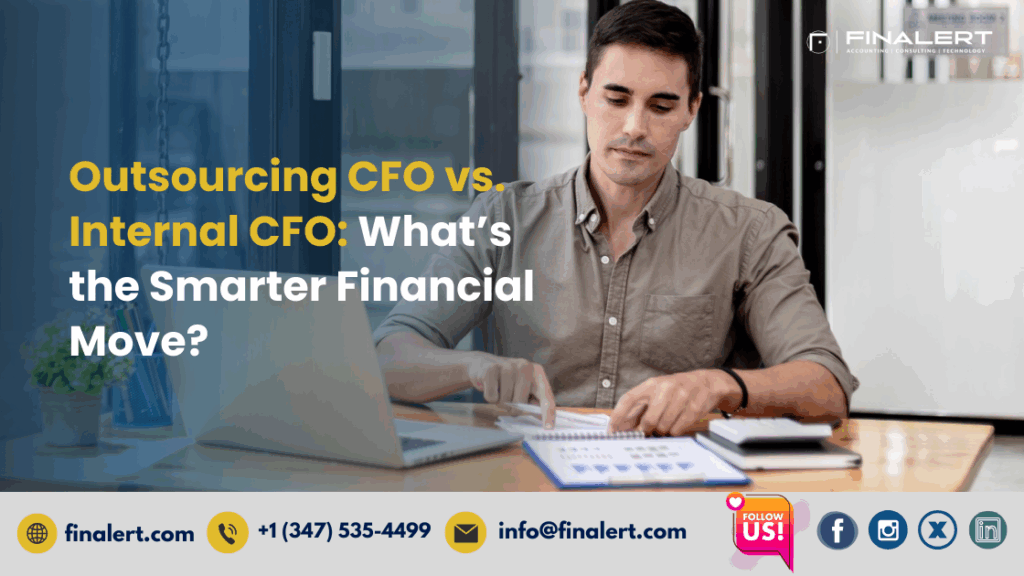
As the company grows, its financial complexity increases and sound financial leadership becomes a strategic necessity.
When management has trouble keeping the financial records in order, or when cash flow, tax planning, and compliance become too complex for a spreadsheet, getting help from professional accountants is essential for business growth.
The Chief Financial Officer (CFO) plays an important role in shaping a company’s strategy, maintaining financial health, and supporting sustainable growth.
As your business expands, a main question comes up: Should you bring on an in-house CFO or get CFO services from an outside firm?
This decision is about more than just cost. You need to think about how financial leadership fits with your company’s plans, growth stage, and what you want to achieve in the long run.
In this guide, we will discuss the differences between an outsourced CFO and an in-house CFO. We will also determine which option makes better financial sense for your organization.
What is a CFO?
A Chief Financial Officer (CFO) is a senior executive who manages the financial health of an organization.
The CFO’s role goes beyond being an accountant. It contains financial planning, managing risks, handling accounting, preparing reports, and contributing to the company’s overall strategy.
The key commitments include:
CFOs play a crucial role in steering companies toward sustainable growth. Through their financial analysis and strategic planning, they make informed decisions that foster profitability and expansion.
A well-defined CFO structure ensures effective financial management, risk mitigation, and alignment of financial strategy with business goals.
For many businesses, the cost is a crucial factor in making decisions. Here’s a table comparison of outsourced CFO services cost in the USA with internal CFO salary cost in the USA.
| Aspect | Internal CFO | Outsourced CFO |
| Salary | $10,900 – $39k per month | $3 – $12k per month |
| Benefits | Bonuses, benefits, taxes, office spaces, and equipment add to the cost | Flat monthly fee or hourly rate; no benefits, bonuses, or overhead costs. |
| Scale | Limited Capacity | Flexible Workforce scaling to client demands |
| Flexibility | Fixed commitment | Flexible hours and scope |
An internal CFO can significantly increase long-term expenses, while outsourcing CFO services allows for paying only for the expertise.
The internal CFO’s primary focus is on your company and is embedded in your culture, attending all-hands meetings, building relationships with your team, and developing a nuanced understanding of your business’s specific challenges and opportunities.
A full-time CFO gains intimate knowledge of your company’s culture and can lead to more tailored decision-making and stronger relationships.
The virtual CFO services in the US can bring a different value as they typically work with a portfolio of clients, exposing them to a vast range of business models and financial challenges.
They can offer specialized expertise in areas such as mergers & acquisitions, fundraising, restructuring, or compliance without having to hire a multiple specialist.
Hiring an Internal CFO can be a lengthy process followed by significant ramp-up time as they learn the ins and outs and culture of the company. It might take months of recruiting, interviewing, and onboarding before they start working and implementing their strategies.
The outsourced CFO can be onboarded quickly in a matter of weeks and can begin contributing to the company’s financial strategy and operations immediately.
The right choice often depends on your business’s current stage.
The primary challenge with an in-house CFO is the high fixed cost. With the annual fixed wages, recruitment and onboarding costs make them significantly expensive.
Moreover, a full-time CFO might have a narrow range of experience compared to an outsourced CFO and can be resistant to change due to internal dynamics.
Further, finding and keeping a qualified CFO can be hard and expensive.
The problem with an outsourced CFO is their limited availability. A company may also have less control over financial strategies and decisions when working with an external party.
They might not be around for spontaneous meetings or daily check-ins.
If the CFO does not completely understand the company’s vision, it can lead to mismatched priorities. Keeping strong and steady communication is crucial for the success of this approach.
Choosing the right financial leader is an important decision. It should reflect your business’s unique needs, growth stage, and budget. When exploring your options, consider the organization’s immediate financial needs along with your long-term goals.
Whether you opt for an in-house CFO or an outsourced CFO, make sure to assess your business’s needs and resources.
At Finalert, we provide tailored financial leadership solutions and help you navigate your business’s financial future with our Outsourced Accounting Services USA.
Whether you need a fractional CFO for a startup or ongoing strategic support for a growing enterprise, our experts can help you right away.
Our team combines bookkeeping and accounting services, CFO expertise, and strategic insight to help you grow with confidence.
Similar Articles
No results available
Get in touch with Finalert today for tailored business solutions!
No results available
Ready to thrive? Connect with Finalert today and let’s succeed together in the dynamic global market.
© 2025 Finalert. All rights reserved.
Ready to thrive in the dynamic global market? Finalert LLC offers expert financial services, including accounting, consulting, and technology solutions, tailored to your business needs.
Address
Accounting
Quick Links
Consulting
Industries
© 2025 Finalert LLC. All rights reserved.